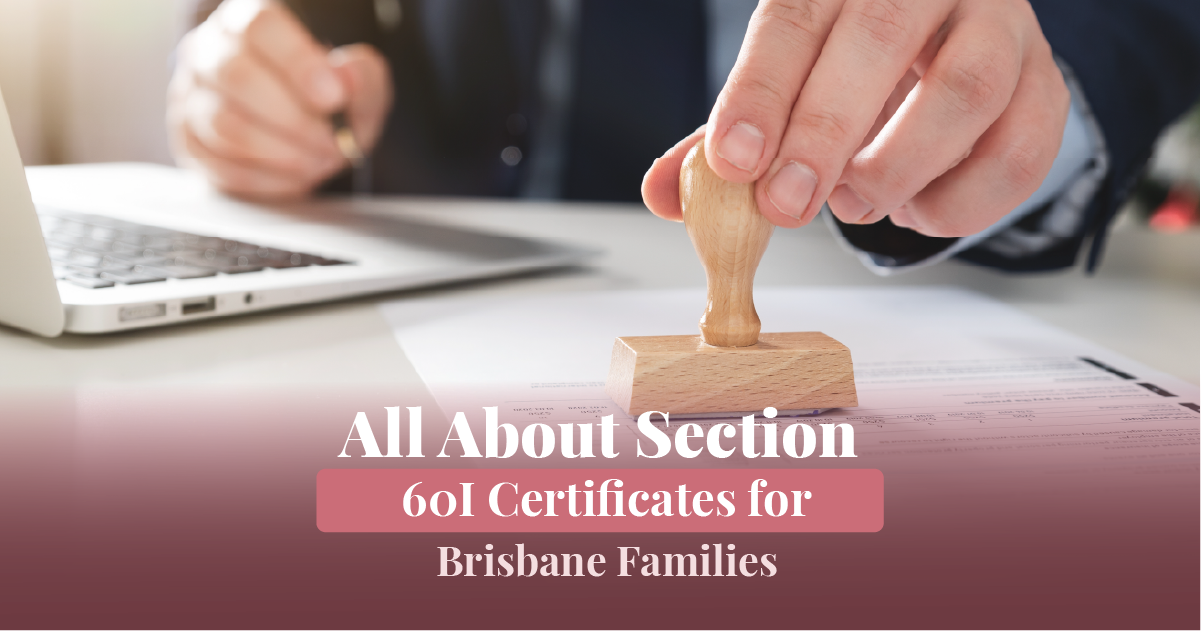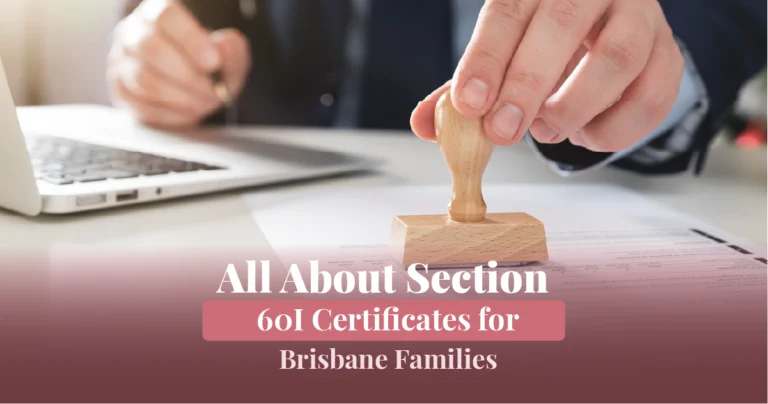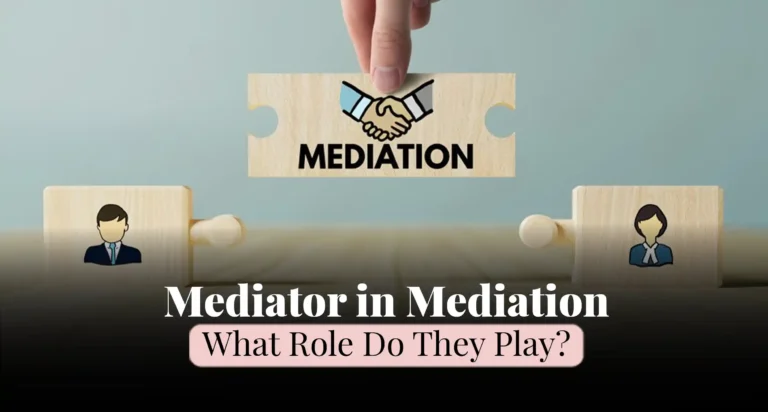All About Section 60I Certificates for Brisbane Families

Share
Table of Contents
- Introduction
- What is Section 60I Certificate
- When Is a Section 60I Certificate Required?
- The Intake Process: Assessing Suitability for Mediation
- What Happens If Mediation Fails?
- Expert Guidance with Section 60I Certificates
- Frequently Asked Questions
- Conclusion
Introduction
Dealing with family law disputes, and issues relating to parenting arrangements can be emotionally and financially challenging. The Family Law Act 1975 encourages families to resolve disputes by avoiding courts through Family Dispute Resolution, the process of mediation that assists families to reach amicable child-focused solutions. A critical component of this process, especially for Brisbane families, is the Section 60I Certificate, a legal requirement in most cases before parenting matters can proceed to the Federal Circuit and Family Court of Australia. This guide discusses what a Section 60I Certificate is and when it is needed, the intake process, what happens when mediation does not resolve all issues, and the role that Family Dispute Resolution Practitioners, like Janelle Rollo, at Summit Conflict Resolution play in assisting families in Brisbane and beyond.
What is Section 60I Certificate?
A Certificate Under Section 60I is a formal document issued by a registered Family Dispute Resolution Practitioner under Section 60I of the Family Law Act 1975. Most of the time, it is needed before you can file an application for parenting orders with the Federal Circuit and Family Court of Australia. The certificate indicates that the parties involved in a parenting dispute have either attempted Family Dispute Resolution or that mediation was deemed unsuitable.
Purpose of the Certificate
The certificate ensures that families explore mediation to resolve disputes about parenting arrangements, such as where children live, how much time they spend with each parent, or specific issues like schooling, child support, or relocation. The Family Law Act 1975 (C’th) prioritises Family Dispute Resolution to reduce the emotional and financial burden of litigation, promote child-focused outcomes, and encourage cooperative parenting.
Types of Certificates (H3)
There are five types of Section 60I Certificates, each reflecting the outcome of the Family Dispute Resolution process or the reason mediation did not proceed:
- Non-Attendance: Issued when one party refuses to attend Family Dispute Resolution or fails to engage.
- Not Suitable for Family Dispute Resolution: Issued when mediation is inappropriate due to factors like family violence, safety concerns, or power imbalances.
- Attempted but Unsuccessful: Issued when both parties attend but no agreement is reached.
- Genuine Effort Not Made: Issued when one or both parties do not make a genuine effort to resolve the dispute.
- Agreement Reached: Issued when mediation is successful, but parties may still need to file for parenting orders to formalise the agreement.
The requirement for a Section 60I Certificate underscores Australia’s commitment to resolving family disputes outside the courtroom, making it a vital step for Brisbane families.
When Is a Section 60I Certificate Required?
Under Section 60I of the Family Law Act, anyone seeking parenting orders from the Federal Circuit and Family Court of Australia must provide a Section 60I Certificate unless an exemption applies. This requirement applies to disputes involving:
- Parenting arrangements, such as where children live or time spent with each parent.
- Child support agreements.
- Relocation disputes.
- Specific issues like schooling or medical decisions.
Exemptions
Exemptions to the certificate requirement include:
- Urgent Matters: Cases involving immediate risks to a child’s safety, such as abuse or neglect.
- Family Violence or Safety Concerns: Situations where mediation could pose a risk.
- Consent Orders: When both parties agree on arrangements without mediation.
- Impracticality: Cases where participation is not possible due to incapacity or geographic constraints.
Consulting a Family Dispute Resolution Practitioner is essential for Brisbane families to determine whether an exemption applies or if mediation is the appropriate first step.
The Intake Process: Assessing Suitability for Mediation
The Family Dispute Resolution process begins with an intake session, where the Family Dispute Resolution Practitioner evaluates whether mediation is suitable. This screening ensures mediation is safe and productive.
What Happens During Intake?
The Family Dispute Resolution Practitioner, such as Janelle Rollo at Summit Conflict Resolution, will:
- Discuss the nature of the dispute, including any history of conflict.
- Screen for safety concerns, such as family violence or power imbalances.
- Explain the mediation process, length of the session and costs.
- Determine whether mediation is appropriate or whether to issue a certificate under Section 60I without proceeding.
Intake sessions are typically conducted separately with each party, either in person or via secure online platforms like Zoom or Teams, ensuring accessibility for Brisbane families.
Factors That May Preclude Mediation
Mediation may not be appropriate in situations involving a history of family violence, where one party feels unsafe, there are significant power imbalances, or where one of the parties is unwilling to participate in mediation. If mediation has been deemed inappropriate, the Family Dispute Resolution Practitioner will provide the party requesting a Section 60I Certificate, which allows the party to make an application to the Federal Circuit and family Court of Australia.
What Happens If Mediation Fails?
If Family Dispute Resolution does not resolve the dispute, the Family Dispute Resolution Practitioner will issue a Section 60I Certificate, allowing a party to file for parenting orders in the Federal Circuit and Family Court of Australia.
Steps After Unsuccessful Mediation
- Receive the Certificate: The certificate will indicate the reason mediation failed, such as “Attempted but Unsuccessful” or “Non-Attendance.”
- File an Application: Submit the certificate with an Initiating Application to the court, an affidavit and all associated required documents, outlining the desired parenting orders.
- Prepare for Court: Gather evidence and seek legal advice to strengthen your case.
- Court Process: The court reviews the certificate and dispute circumstances, which may influence its view of the parties’ efforts.
Even if mediation fails, partial agreements can be documented in a Parenting Plan or Consent Orders, simplifying court proceedings. Mediation can also clarify and narrow the issues in dispute and improve communication, providing a foundation for future negotiations.
Expert Guidance with Section 60I Certificates
Navigating Family Dispute Resolution and obtaining a Section 60I Certificate can be complex, especially during emotionally charged disputes. Professionals like Janelle Rollo at Summit Conflict Resolution offer invaluable support.
Janelle Rollo’s Expertise
Janelle Rollo is a Family Law Solicitor and Independent Children’s Lawyer with 19 years of experience practising Family Law in Brisbane and South-East Queensland. She is extremely supportive, child-focussed and understands the mediation process. Her professional services include:
- Detailed intake screening sessions to ensure mediation is appropriate.
- Facilitating half-day (4 hours) or full-day (8 hours) mediation sessions, in person or online.
- Issuing Section 60I Certificates promptly if mediation is unsuitable or unsuccessful.
- Prioritising children’s well-being, drawing on her experience as an Independent Children’s Lawyer.
Summit Conflict Resolution offers accessible, cost-effective mediation across Australia, with a focus on reducing emotional and financial strain. Janelle’s extensive knowledge ensures families receive informed, empathetic guidance through the Section 60I Certificate process.
Conclusion
For Brisbane families navigating parenting disputes, the Section 60I Certificate is a pivotal step toward resolution. Whether you achieve an agreement through Family Dispute Resolution or need to proceed to court, understanding this process empowers informed decisions. With the expert guidance of Janelle Rollo at Summit Conflict Resolution, families can approach mediation with confidence, supported by compassionate and experienced expertise.
Frequently Asked Questions
- What is a Section 60I Certificate, and why is it required?
A Section 60I Certificate is a document issued by a Family Dispute Resolution Practitioner confirming that Family Dispute Resolution was attempted or deemed unsuitable. It’s required before applying for parenting orders in court to ensure mediation is explored first. - When can I skip mediation and go straight to court?
You may bypass mediation in cases involving urgent child safety concerns, family violence, or when both parties agree to Consent Orders. A Family Dispute Resolution Practitioner can advise if an exemption applies. - How long does the Family Dispute Resolution process take?
The intake session typically lasts 1-2 hours, while mediation sessions may take 4-8 hours, depending on the complexity of the dispute. - What if the other party refuses to participate in mediation?
If one party refuses to attend Family Dispute Resolution, the Family Dispute Resolution Practitioner can issue a Section 60I Certificate for non-attendance, allowing you to proceed to court. - Can mediated agreements be made legally binding?
Yes, agreements reached in mediation can be formalised as Consent Orders, Parenting Plans, or Binding Financial Agreements (for property matters) with the assistance of a Family Dispute Resolution Practitioner.


